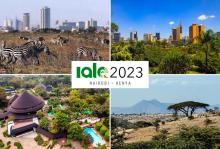
The International Association for Landscape Ecology (IALE) is excited to announce the 2023 IALE World Congress will take place in Nairobi, Kenya, from 10th – 15th, July 2023.
The IALE World Congress occurs every four years and is the premier event for landscape ecologists worldwide to address topics in landscape ecology that range from local to global in scale. During the World Congress, landscape ecologists from public, private, and non-profit sectors will address a broad spectrum of environmental challenges and their potential solutions. The 2023 World Congress will be a hybrid (online/in person) event and it is for the first time being hosted in the Global South. The World Congress theme is ‘Transboundary Resource Management, Climate Change and Environmental Resilience’.
The World Congress will include plenaries, symposium, oral sessions, posters sessions, a social dinner, and field trips. It is jointly hosted by Kenyatta University (KU), Regional Center for Mapping of Resources for Development (RCMRD), National Museum of Kenya (NMK), Institute of Climate Change and Adaptation Institute, University of Nairobi (UON), the United Nations Environment Programme (UNEP) and in collaboration with the African-Chapter of IALE (Africa-IALE).
Nairobi is exceptionally beautiful, accessible, and safe. The planned post conference excursions include: Nairobi National Park, Karura Forest Nature trails, The National Museums, Kakamega forest, and Watamu Marine National Park and Reserve. Furthermore, Kenya is well known for the Great Rift Valley. July is an excellent time to visit Kenya because it is the dry season (fewer mosquitos) and wildlife will be easier to see.
Theme: ‘Transboundary Resource Management, Climate Change and Environmental Resilience’
Conference Sub-Themes
- Transboundary ecosystems in the Anthropocene: The shared ecosystems and natural resources across country boundaries and the anthropogenic effects. How human activities are altering these transboundary ecosystems
- Managing climate risk in transboundary ecosystems: Climate change and global warming in the transboundary ecosystems; mitigation, adaptation, geoengineering,
- Borderlands, cross-border resources, and environmental resilience: Strengthening resilience in borderlands ecosystems, disturbance of ecosystems
- Building resilience and security: Food security, water security, and livelihoods
- Climate resilient livelihoods: Climate resilient agricultural practices, adaptive agriculture, agroecology,
- Data science and geospatial technology for sustainable landscape management:
- Drivers of landscape change and sustainability at multiple scales:
- Ecological sustainability in urban landscapes and smart cities
- Water-Energy-Food nexus :